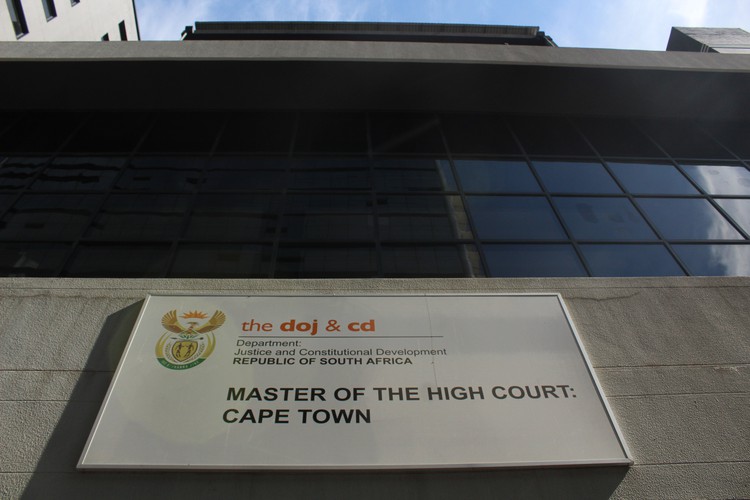
The Master’s Office is facing a backlog of cases. Photo: Masixole Feni
11 September 2019
Most people may never heard of the Master of the High Court but at some point in time, most of us will have to interact with it, whether wealthy or poor. When a loved one dies, it needs to be reported to one of fifteen Master’s offices in the country which ensure that the deceased’s assets are distributed to the right people. In some cases a will or testament facilitates who gets what.
So when GroundUp received a complaint from a member of the public about an alleged backlog of cases at the Master of the High Court office in Cape Town, we investigated.
Following an article we published on the backlog of overdue judgments at the Western Cape High Court, Nicci Botha claimed that there were “thousands of cases” at the Master’s office that could not be wound up due to lost documents.
Her sister’s estate is one.
Botha, says she’s been waiting for more than a year for a Liquidation and Distribution letter to finalise her sister’s estate, which she says is a relatively simple one to wind up. According to the Administration of Estates Act, this process should take six months after a letter of executorship is issued. Botha says the letter was issued in April 2017, after her sister’s death on 15 February the same year.
Botha was told by the executor for her sister’s estate that the office had lost the documents in her file. The executor had sent countless emails and calls to the Master’s office to follow up on the matter with minimal response.
When GroundUp arrived at the offices on Tuesday, 3 September to investigate, we left without any concrete answers. The Master of the High Court, Zureena Agulhas, was unavailable and her secretary redirected us to Sizakele Mbewana, a deputy master of the High Court, who was also absent from his office. We were then prompted to speak to Sanele Nqabeni, a senior state accountant, who told us that he wasn’t authorised to speak to the media, yet the office did not have a spokesperson.
We then followed up with email enquiries to Agulhas and Mbewana with no response. Agulhas’ office number was called multiple times but the phone just rang. An email was sent to the Acting Chief Master of the High Court Theresia Bezuidenhout who forwarded our query to the Department of Justice and Constitutional Development’s media team. There was no response thereafter.
Aaron Roup, the National Councillor and Secretary for the Fiduciary Institute of Southern Africa (FISA), says that there are issues in all the Master’s offices in the country.
“There are fifteen offices nationwide. If three of them are functioning normally at any given time, that’s a miracle,” said Roup.
He flagged the Pretoria, Johannesburg, Pietermaritzburg and Cape Town Master’s offices as some of the worst performing in the country.
“That is known from the view of the practitioners. It is known from the view of the general public. It is also known by the Acting Chief Master and she’s pulling her hair out in that respect.” (The Acting Chief Master said she was unable to answer our queries.)
FISA is the only professional body and non-profit organisation that represents fiduciary practitioners in Southern Africa. It sets minimum standards for the industry and works closely with the Master’s Office and SARS. Fiduciary practitioners take care of money or other assets for people.
Botha and Roup pinpointed understaffing issues as a cause of the chaos at the Cape Town office.
“They are under pressure in terms of deliverables, with no staff filling the vacant positions … The one rumour is that there is no money to pay for the salaries for those positions. The other story is that there is budget, but they haven’t found the right people. So again, my view of it is that they are just simply making excuses to not deliver at the end of the day,” said Roup.
The Master of the High Court falls under the Department of Justice and Constitutional Development. There is a Master’s office in each provincial division of the High Court of South Africa and it has five main duties: the administration of deceased estates, liquidations, administration of the guardian’s fund, protecting the interests of minors, and the registration and supervision of trusts.
If a person has died and left behind property or a will, this becomes a deceased estate which must be administered and distributed to the relevant persons by the Master’s office in the area where the person was living 12 months before their death.
The deceased’s assets such as bank accounts are frozen, meaning dependents or family members cannot access the funds until the estate has been reported and processed by the Master’s office. The longer it takes for the deceased estate to be wound up, the longer dependents of deceased people are at risk of being left without money.
“The saddest part is that there are families who are dependent on the loved one’s estate being finalised, so that they can get on with their lives,” said Botha, who is still waiting for her sister’s affairs to be wrapped up.
CORRECTION: An earlier version of the article had the wrong sex for Botha. Our apologies.